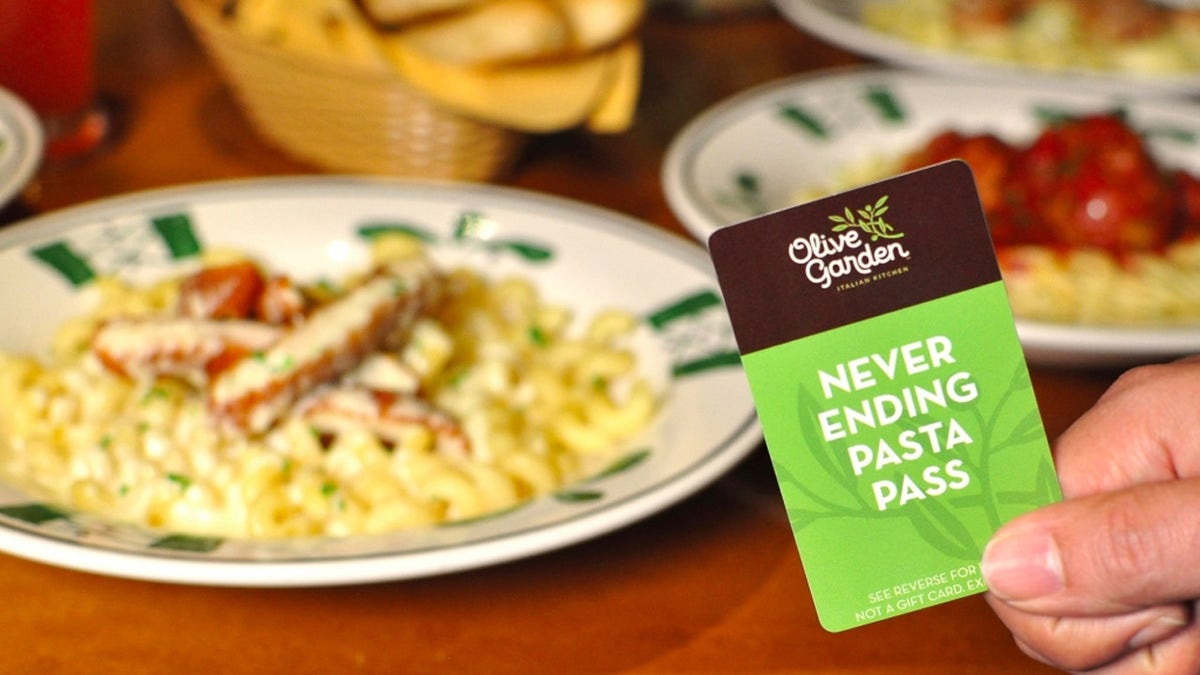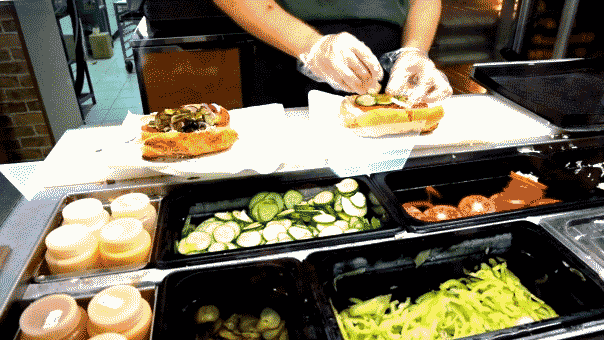
For the second year in a row, Olive Garden almost immediately sold passes that gave customers access to never-ending pasta, salad, bread sticks and soda. (Olive Garden)
Last week, food fans were outraged when they missed a chance to buy Olive Garden’s second annual Never Ending Pasta Pass.
Two thousand passes, which cost $100 for an individual or $300 for a family of four, enables users to dine at any Olive Garden location as many times as they want during a seven week period.
But the online promotion that’s developed a cult-like following ended almost as fast as it began this year. That's because the passes sold out in less than a second. Yes, you read right. Less than one second.
The passes caused uproar last year when the promotion, designed to drum up excitement and demand, backfired after Olive Garden’s website crashed. When people finally got through, the 1,000 passes that went on sale were sold out in 45 minutes and—adding insult to injury, quickly showed up on sites like eBay and Craigslists for double, even triple the original price.
After last year’s fiasco, we question how the passes could disappear in less than one second. Was this a scam or was it a legitimate?
Sam Cinquegrani, CEO of ObjectWave Corp, a company that builds e-commerce sites for retailers, says that says it’s not unusual for a sophisticated computer server to be able to process tens of thousands of transactions per second.
While not knowing Olive Garden’s system, he says that the chain likely anticipated the high demand for the passes.
“A second in computer time is actually pretty long,” Cinquegrani told FoxNews.com, adding that some trading sites he has built in the past are able to handle up to 18,000 transactions in 600 microseconds. “So selling out that quickly doesn’t surprise me, it actually means their technology was up to task.”
Another thing that had us scratching our heads is that least two lucky Olive Garden fans claim they were able to score more than one pass—even after seeing the “Sold Out” banner on the screen. How was that possible? Are they hackers, or just lucky?
“I doubt they could figure out something this complicated in a minute with so many people logged on. No website is perfect so it’s very likely that the sold out sign was their exception handling …or someone had the pass in their cart and decided to change their mind,” Cinquegrani said, noting that the likelihood of someone scoring a second pass was probably extremely low.
This year, just a handful of passes are being sold eBay so far --although there are a few out there. This shows that it’s unlikely that any one individual was able to hack into the system to buy multiple passes --and that the ones up for sale are just those trying to profit on the passes they scored.
But, like last year, Olive Garden fans –at least those without their finger on the mouse--have a bad taste in their mouths over the execution of the promotion.
“People don’t necessarily understand how these types of promotions work so it’s really important that they [Olive Garden] just be as transparent as possible to neutralize the situation,” says Elizabeth Friend, senior food service analyst with the research firm, Euromonitor International.
So far the chain has simply said that their “system allowed in the first 2,000 guests to purchase the available Pasta Passes, which occurred in less than a second.” But Friend thinks they could have done more to make it seem fairer to loyal fans.
“Knowing the demand they faced last year, it might have been better if they went with a lottery system or they could have made it into a playful social media contest, like hashtag Never Ending, with people posting videos showing how much they wanted a pass,” Friend says, adding that either way, not everyone is going to win.
To ease the pain, Olive Garden last week offered a printable 10 percent coupon off one adult entrée at any Olive Garden location and has hinted that they will be giving away more Never Ending passes to people following the chain’s social media accounts.
This type of outreach, according to Friend, is likely to smooth some ruffled feathers.
But sometimes, the buzz-- and even anger-- created over a highly coveted promotion is exactly what companies want.
“Luxury Brands build scarcity into their marketing strategy which means they are always trying to build this mystique around certain items,” says Robin Lewis, a retail expert who runs his own blog The Robin Report.
Lewis says the “gotta have it” mentality may anger customers but it still fuels excitement. And doing it mostly by worth of mouth saves the company marketing expenses.
“It’s an incredibly intelligent marketing strategy,” said Lewis. “The strength of that promotion—I mean millions of people logging on at once to buy pasta that’s available everywhere? Pretty genius.”








































